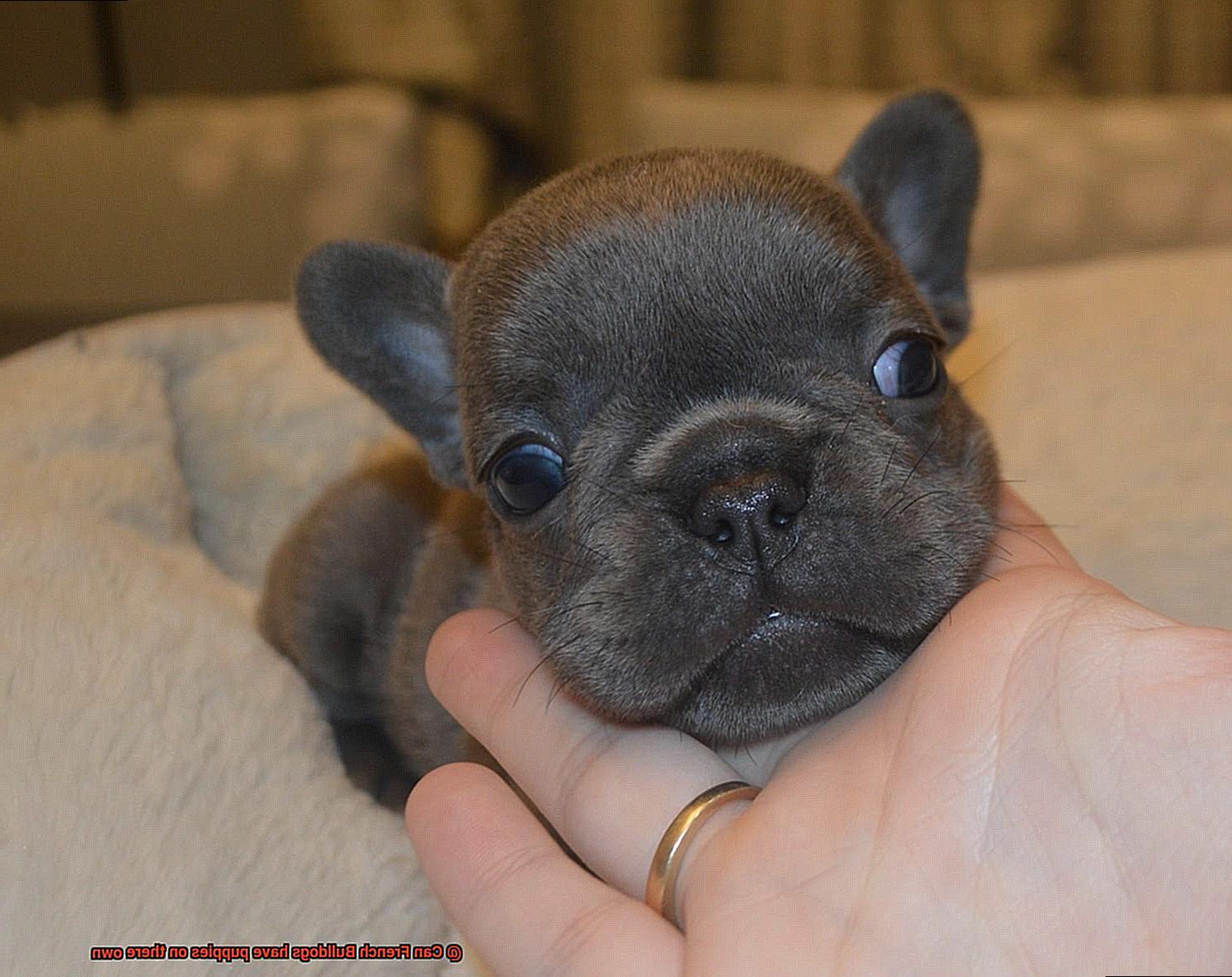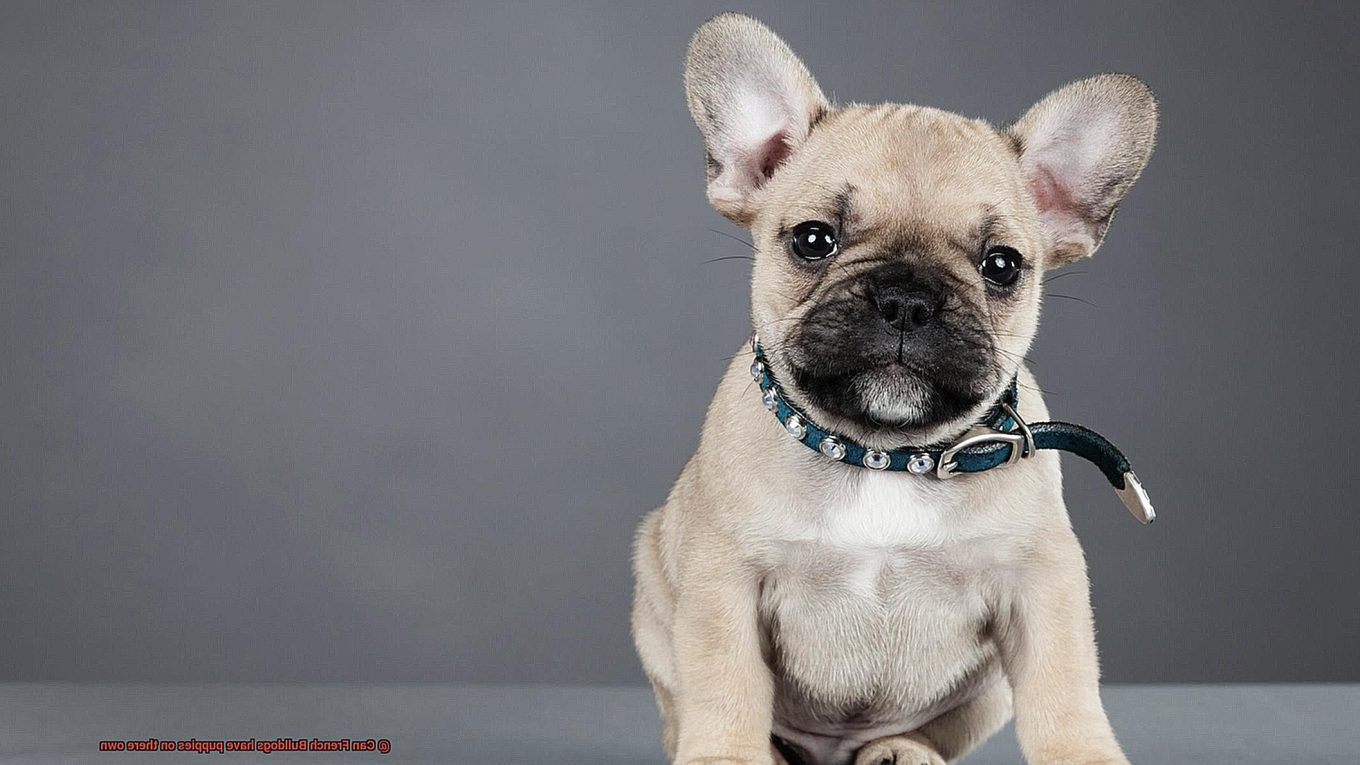Can French Bulldogs have puppies on there own?
These lovable canines possess an extraordinary ability that sets them apart from the rest – they can bring new life into the world without any human intervention. Yes, you heard it right. French Bulldogs have a unique instinctive capability to have puppies on their own, making them all the more fascinating.
In this captivating blog post, we will delve into the inner workings of this remarkable reproductive process, shining a light on how French Bulldogs navigate the journey of childbirth without human assistance. But before we embark on this enlightening adventure, let’s address any lingering doubts about whether these pint-sized pooches can handle the miracle of life on their own.
So brace yourselves for an enlightening quest as we unravel the secrets behind this miraculous phenomenon and provide valuable insights into what potential French Bulldog owners can expect if their furry companion decides to venture into motherhood. It’s time to dive deep into the incredible reproductive world of French Bulldogs and uncover the awe-inspiring abilities of these remarkable creatures. So without further ado, let’s embark on this enthralling exploration together.
The Physical Structure of French Bulldogs and Its Impact on Natural Breeding
Contents
- 1 The Physical Structure of French Bulldogs and Its Impact on Natural Breeding
- 2 Age and Health Factors That Can Affect French Bulldog Reproduction
- 3 Consulting a Veterinarian Before Breeding French Bulldogs
- 4 Assisted Reproductive Techniques for French Bulldogs
- 5 Responsible Breeding Practices for French Bulldog Owners
- 6 The Benefits of Natural vs Assisted Reproduction in French Bulldogs
- 7 Common Complications During Pregnancy and Delivery in French Bulldogs
- 8 Ensuring the Health and Wellbeing of Mother and Puppies
- 9 Conclusion

French Bulldogs are beloved pets known for their unique physical features. However, these features can also affect their ability to breed naturally. In this article, we will explore how the physical structure of French Bulldogs impacts their natural breeding capabilities and what owners should consider before breeding their dogs.
Compact and Muscular Body:
French Bulldogs have a compact and muscular body, which can make natural breeding challenging. Their short and stocky build may limit their range of motion and make it difficult for them to engage in successful mating.
Brachycephalic Features:
The breed’s distinctive flat face and pushed-in nose, known as brachycephalic features, can cause respiratory issues and breathing difficulties. These challenges can further complicate the breeding process, as proper breathing is essential during mating.
Large Head-to-Body Proportion:
French Bulldogs have a relatively large head in proportion to their body size. This can create difficulties during mating, as the male may struggle to position himself correctly for successful copulation.
Narrow Hips:
Another physical characteristic that impacts natural breeding is the breed’s narrow hips. This can lead to dystocia, a condition where the puppies are too big to pass through the birth canal easily. As a result, many French Bulldogs require caesarean sections to deliver their puppies safely.

Short Tail:
While seemingly insignificant, the breed’s short tail can affect communication and positioning during mating. A longer tail provides visual cues that help dogs understand each other’s intentions, which may be compromised in French Bulldogs due to their shorter tail length.
French Bulldogs have a unique physical structure that poses challenges to their ability to breed naturally. Their compact body, brachycephalic features, large head-to-body proportion, narrow hips, and short tail all contribute to these difficulties. It is essential for owners to work closely with their veterinarians when considering breeding and to prioritize the health and safety of both the mother and puppies. Responsible breeding practices, including artificial insemination and caesarean sections, may be necessary to ensure successful reproduction. By understanding these physical limitations, French Bulldog owners can make informed decisions and help preserve the breed’s health and well-being.

Age and Health Factors That Can Affect French Bulldog Reproduction
French Bulldogs are undeniably adorable, but their unique physical features can present challenges when it comes to reproduction. In this article, we will explore the age and health factors that can impact French Bulldog reproduction, helping owners make informed decisions and prioritize the well-being of their beloved pets.
Age Factors:
- Sexual Maturity: Female French Bulldogs typically reach sexual maturity between six and nine months, while males may take a bit longer, usually between eight and ten months. However, reaching sexual maturity does not automatically mean they are ready for breeding.
- Pregnancy Complications: Older female French Bulldogs are more prone to complications during pregnancy and delivery. As they age, their reproductive system may become less efficient, making it difficult to get pregnant or carry a litter to term.

Health Factors:
- Physical Condition: Both male and female French Bulldogs should be in good physical condition before attempting to breed. Health issues such as obesity, respiratory problems, and genetic disorders can negatively impact their ability to reproduce.
- Reproductive Organ Health: Thorough reproductive health screenings are essential for both males and females before breeding. Females should be checked for any abnormalities in the uterus or ovaries, as well as hormone levels. Males should undergo evaluations for testicular health and sperm quality.
- Vaccinations and Infectious Diseases: It is crucial to ensure that both male and female dogs are properly vaccinated and free from infectious diseases that could affect their ability to conceive or maintain a healthy pregnancy.

Age and health factors play a significant role in French Bulldog reproduction. Older females may face difficulties during pregnancy and delivery, while overall physical condition and reproductive organ health are essential for both males and females. Regular veterinary care, thorough health screenings, and responsible breeding practices are crucial for successful reproduction outcomes and the production of healthy offspring.
Consulting a Veterinarian Before Breeding French Bulldogs
French Bulldogs are undoubtedly one of the most popular dog breeds, known for their adorable looks and friendly personalities. However, breeding French Bulldogs can be a complex and challenging process that requires careful consideration and expert guidance. That’s why it is crucial to consult with a veterinarian before attempting to breed your beloved Frenchie.
Assessing Health and Genetic Background
French Bulldogs are prone to certain health issues, such as respiratory problems, hip dysplasia, and eye disorders. Consulting a veterinarian allows them to evaluate your dog’s overall health and genetic background to determine if it is a suitable candidate for breeding. They will check for any existing health conditions that may affect its ability to conceive or carry a pregnancy successfully.
Genetic Testing
Genetic testing is another essential aspect that a veterinarian will discuss with you. They will recommend conducting tests to check for any hereditary diseases or conditions that could be passed down to the puppies. This information is vital in ensuring the long-term health and well-being of the offspring.
Vaccination Status
A veterinarian will also review your French Bulldog’s vaccination status and ensure that all necessary vaccinations are up to date. This is crucial to prevent the transmission of infectious diseases during breeding or pregnancy.
Timing for Breeding
Proper timing is key when it comes to breeding French Bulldogs. A veterinarian will monitor your dog’s reproductive cycle and advise you on the best time for mating to maximize the chances of successful fertilization.
Responsible Breeding Practices
It is important to note that breeding French Bulldogs should not be taken lightly. It requires careful consideration of various factors, including the breed’s specific needs and potential risks. Consulting with a veterinarian ensures that you are taking the responsible approach towards breeding and prioritizing the health and well-being of both the mother and puppies.
Assisted Reproductive Techniques for French Bulldogs
Ah, French Bulldogs, those adorable little bundles of joy that capture our hearts with their squishy faces and playful personalities. But what happens when these lovable pooches face difficulties in reproducing naturally? That’s where assisted reproductive techniques come into play, offering a glimmer of hope for French Bulldog breeders and owners alike. In this guide, we’ll explore the various assisted reproductive techniques available for French Bulldogs, from artificial insemination to in vitro fertilization, and everything in between.
Artificial Insemination: Bringing Romance to a Whole New Level
Distance can be a real barrier when it comes to breeding French Bulldogs. Luckily, artificial insemination swoops in to save the day. With this technique, semen is collected from a male dog and introduced into the female’s reproductive tract. It’s like playing cupid, but with a little more science involved. Artificial insemination is also useful when natural breeding isn’t possible due to physical limitations or if you want to select a mate that isn’t physically present.
Hormonal Therapy: Getting Those Reproductive Juices Flowing
Sometimes, our furry friends need a little hormonal boost to get their reproductive cycles back on track. Hormonal therapy involves the administration of hormones to regulate and stimulate the reproductive cycle in female French Bulldogs. This not only helps synchronize ovulation timing for optimal breeding but can also address irregular estrous cycles or enhance fertility in dogs with reproductive issues.
In Vitro Fertilization (IVF): Where Science Meets Puppy Love
If you thought IVF was just for humans, think again. In vitro fertilization is a cutting-edge technique that involves retrieving eggs from the female’s ovaries and fertilizing them with sperm in a laboratory setting. The resulting embryos are then transferred back into the female’s uterus, hopefully leading to a successful pregnancy. IVF is particularly useful for French Bulldogs with genetic disorders or those that have difficulty conceiving naturally.
Embryo Transfer: A Surrogate’s Love Story
Sometimes, Mother Nature needs a helping hand, and that’s where embryo transfer comes in. This technique involves transferring embryos, previously created through IVF or other methods, into a surrogate female dog’s uterus. Not only does this allow females unable to carry a pregnancy to still have biological offspring, but it also maximizes the number of valuable offspring for breeders.
Remember, these assisted reproductive techniques should only be performed by qualified professionals who specialize in reproductive medicine. They have the knowledge and skills necessary to conduct these procedures safely and effectively, ensuring the well-being of both the female dog and the puppies.
While assisted reproductive techniques offer hope for French Bulldogs facing reproductive challenges, it’s important to weigh the potential risks and limitations associated with these procedures. Consulting with a veterinarian who specializes in reproduction is crucial to determine the best course of action for your French Bulldog’s specific situation.
Responsible Breeding Practices for French Bulldog Owners
French Bulldogs, with their adorable squished faces and charming personalities, have become increasingly popular as pets. However, owning a French Bulldog comes with a great responsibility, especially if you decide to breed them. In this blog post, we will explore the importance of responsible breeding practices for French Bulldog owners and provide you with essential tips to ensure the health and well-being of both the parent dogs and their offspring.
- Selecting Suitable Breeding Pairs: Just like humans, dogs have their own unique genetic makeup. It is crucial to carefully evaluate the health, temperament, and conformation of both the male and female French Bulldogs before deciding to breed them. Genetic testing can help identify any potential hereditary health issues that may be passed on to the puppies. Remember, breeding dogs with genetic disorders or significant health problems should be avoided at all costs.
- Considering Age and Overall Health: Patience is key when it comes to breeding French Bulldogs. Female French Bulldogs should be at least two years old before being bred, as they need time for their bodies to fully mature. Breeding too early can lead to complications during pregnancy and delivery. Additionally, both male and female dogs should be in optimal health, which includes regular veterinary check-ups, vaccinations, and a proper diet.
- Monitoring the Heat Cycle: To increase the chances of successful breeding, it is important to closely monitor the female French Bulldog’s heat cycle. This will help determine the most fertile period for mating. Due to their unique anatomy, artificial insemination is often recommended for French Bulldogs to minimize physical strain on both dogs during the breeding process.
- Providing Proper Prenatal Care: Once pregnancy is confirmed, responsible breeders should provide proper prenatal care for the female dog. This includes regular veterinary check-ups, a balanced diet, and appropriate exercise. Creating a safe and comfortable environment for the pregnant dog is also crucial, ensuring she has a quiet space to rest and prepare for the arrival of her puppies.
- Being Prepared for Delivery: French Bulldogs are known to have certain birthing difficulties due to their large heads and narrow pelvises. Responsible breeders should have a contingency plan in place and be ready to provide assistance if needed. This may involve having a trusted veterinarian on standby or even considering a planned cesarean section if necessary for the safety of the mother and puppies.
- Continued Care for the Puppies: The responsibilities do not end once the puppies are born. Responsible breeders should continue to provide proper care and attention, which includes regular veterinary check-ups, vaccinations, proper nutrition, and socialization. It is important to screen potential buyers carefully and ensure that the puppies are placed in loving and responsible homes.
The Benefits of Natural vs Assisted Reproduction in French Bulldogs
French Bulldogs are adorable little bundles of joy, and if you’re a breeder or considering breeding these lovable pups, you may be wondering about the benefits of natural versus assisted reproduction. Well, fear not. I’m here to shed some light on this topic and help you make an informed decision.
Natural Reproduction: Embracing Mother Nature’s Way
When it comes to the benefits of natural reproduction in French Bulldogs, there are a few key points to consider. Firstly, natural mating allows for the preservation of the breed’s genetic diversity. This means that when two dogs mate naturally, there is a higher chance of genetic variation, which is essential for maintaining the overall health and vitality of the breed. Just like a box of chocolates, you never know what you’re gonna get.
Another advantage of natural reproduction is the ability to select healthy and compatible mates. Dogs have a natural instinct to choose their mates based on physical and behavioral characteristics. This can contribute to producing offspring with desirable traits, like cute little ears or a playful personality. It’s like matchmaking for dogs.
Additionally, natural reproduction promotes better maternal care. When French Bulldogs conceive naturally, mother dogs typically exhibit strong maternal instincts and take good care of their puppies. They provide them with proper nutrition, grooming, and socialization. It’s like having a built-in nanny for your little furry balls of joy.
Assisted Reproduction: Science Comes to the Rescue
While natural reproduction has its benefits, assisted reproduction techniques also offer some advantages that can’t be ignored. One significant benefit is the ability to breed dogs that are geographically distant or have physical limitations preventing natural mating. That means if you have a stud in New York and a dame in Los Angeles, you can still make baby bulldogs without any problem.
Assisted reproduction also helps breeders overcome fertility issues in French Bulldogs. Some dogs may have difficulty conceiving naturally due to reproductive disorders or low sperm count. Techniques like artificial insemination can bypass these problems and increase the chances of successful breeding. It’s like giving Mother Nature a helping hand.
Furthermore, assisted reproduction techniques provide greater control over the timing of breeding. Breeders can synchronize the reproductive cycles of female dogs and use frozen or chilled semen from male dogs stored in semen banks. This ensures optimal conditions for successful fertilization. It’s like having a Swiss watch for breeding – precise and on time.
Considerations and Choices
Before making a decision between natural and assisted reproduction, it’s important to consider the specific circumstances and goals of the breeder. Natural mating carries the risk of accidental injuries to either dog involved, while assisted reproduction techniques may have higher costs and require specialized knowledge and equipment. It’s like weighing the pros and cons on a scale.
Common Complications During Pregnancy and Delivery in French Bulldogs
If you’re thinking about breeding your French Bulldog or already have a pregnant Frenchie, it’s essential to be aware of the common complications that can occur during pregnancy and delivery. Don’t worry, though – I’ve got your back with all the insider info you need.
- Dystocia: This fancy term simply means difficult labor. French Bulldogs have adorable round heads, but their narrow pelvises can sometimes make labor a bit challenging. Keep an eye out for signs of prolonged labor or fetal distress, as they may indicate the need for a C-section.
- Uterine Inertia: Uh-oh, it looks like someone forgot to tell your Frenchie’s uterus to get on with the contractions. Uterine inertia can cause stalled labor or weak contractions, making it hard for mama to deliver those cute little puppies. Your vet may intervene with some oxytocin or provide manual assistance to get things moving.
- Fetal Malpositioning: Imagine a puppy doing the Macarena instead of getting in position for birth – that’s fetal malpositioning. It can lead to a longer labor or even prevent natural delivery altogether. Your vet might need to step in and lend a helping hand or perform a C-section if necessary.
- Reproductive Complications: French Bulldogs have a higher risk of reproductive issues like infertility or miscarriages. It’s not fair, I know. Hormonal imbalances and structural abnormalities can make it tough for these furry moms-to-be to conceive or carry pregnancies to term.
- Preterm Labor: Sometimes, our furry friends just can’t wait to meet their precious pups and go into labor before they reach full-term gestation. This can result in underdeveloped puppies with potential health problems. Keep a close eye on your Frenchie’s pregnancy, especially during hot weather or when delivering in a whelping box.
- Heat Stress: French Bulldogs may be adorable, but their short snouts and compromised respiratory systems put them at higher risk of heat stress. This can be a significant concern during pregnancy and delivery. Make sure to keep your pregnant Frenchie cool and comfortable, especially in warmer weather or when she’s giving birth.
Remember, it’s crucial to work with a veterinarian experienced in reproductive health to ensure the best care for your Frenchie and her puppies. Regular check-ups, diagnostic tests, and monitoring will help catch any potential complications early on and allow for appropriate interventions.
Ensuring the Health and Wellbeing of Mother and Puppies
As a responsible owner, it’s crucial to take the necessary steps to ensure the health and wellbeing of both the mother and her puppies. Here are some key considerations to keep in mind:
- Regular Veterinary Check-ups: Throughout the pregnancy, it’s essential to schedule regular check-ups with a veterinarian experienced in breeding and reproductive health. They can monitor the progress of the pregnancy, address any concerns, and provide guidance on diet, exercise, and overall care.
- Proper Nutrition: Adequate nutrition is vital during pregnancy to support the mother’s health and the development of the growing puppies. Consult with your veterinarian to determine the best diet for your pregnant Frenchie. High-quality dog food formulated for pregnant and nursing dogs, along with any necessary supplements, should be provided.
- Moderate Exercise: While exercise is essential for a healthy dog, it’s important to moderate activity during pregnancy to avoid excessive strain on the mother’s body. Short walks and gentle playtime are generally recommended, but strenuous activities should be avoided.
- Creating a Whelping Area: Preparing a comfortable and safe whelping area for the mother is crucial. This area should be clean, warm, and quiet to provide a stress-free environment for labor and nursing. Ensure there are nesting materials like blankets or towels to create a cozy space for the mother and her puppies.
- Recognizing Signs of Labor: Educate yourself about the signs of labor in dogs so that you can be prepared when the time comes. Common signs include restlessness, nesting behavior, panting, loss of appetite, and a drop in body temperature. Understanding these signs will help you provide the necessary support and assistance during labor.
- Monitoring Labor: During labor, it’s important to closely monitor the mother’s progress. If you notice any signs of distress or if labor does not progress after a reasonable amount of time, contact your veterinarian immediately. They can provide guidance on whether intervention is necessary.
- Post-Delivery Care: After the puppies are born, it’s essential to provide proper care for both the mother and her newborns. This includes ensuring they are kept warm, assisting with nursing if needed, and monitoring the puppies’ weight gain and overall health.
- Regular Veterinary Check-ups for Puppies: In the early weeks, regular veterinary check-ups for the puppies are important to ensure they are growing and developing properly. Vaccinations, deworming, and other preventive measures should also be discussed with a veterinarian to keep them healthy.
LO9mwHpumQY” >
Conclusion
In conclusion, it is important to understand that French Bulldogs cannot have puppies on their own. Due to their unique anatomy and breeding challenges, they require assistance from humans or veterinary professionals during the birthing process. Attempting to breed a French Bulldog without proper supervision can lead to serious complications and endanger the health of both the mother and her puppies.
French Bulldogs have a narrow pelvis and large heads, making natural birth difficult. They often require cesarean sections to safely deliver their puppies. This procedure should only be performed by experienced veterinarians who can ensure the well-being of both the mother and her offspring.
Furthermore, French Bulldogs are prone to various health issues that can complicate pregnancy and delivery. These include respiratory problems, heat sensitivity, and brachycephalic syndrome. It is crucial for breeders to closely monitor these dogs throughout their pregnancy and provide them with specialized care.
While it may be tempting to let nature take its course, it is not advisable when it comes to French Bulldogs. Breeding should always be approached responsibly, with the welfare of the dogs as the top priority. Seeking professional guidance and support is essential in ensuring a safe and successful breeding experience.
In summary, French Bulldogs cannot have puppies on their own due to their unique anatomy and potential health complications. Responsible breeding practices involve human intervention during the birthing process for the safety of both the mother and her puppies.




